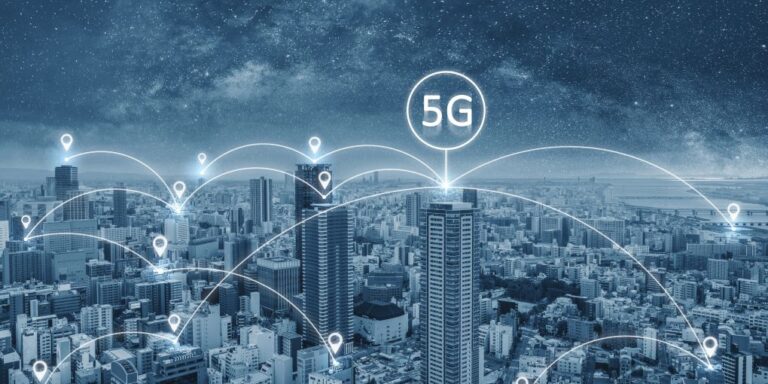The advent of 5G technology has ushered in a new era of connectivity and data processing capabilities that are transforming industries across the board. Beyond the faster download speeds and seamless streaming experiences, 5G is vastly improving data collection and artificial intelligence (AI) capabilities. This groundbreaking technology is poised to revolutionize the way we gather and analyze data, opening up new possibilities for innovation and efficiency.
1. Lightning-Fast Data Transfer
5G, the fifth generation of mobile communication, promises significantly faster data transfer speeds than its predecessors. With download speeds of up to 10 gigabits per second, 5G is a game-changer for data collection. In the context of AI, speed is of the essence, especially for real-time applications. This incredible bandwidth facilitates the rapid transfer of large datasets, which is essential for training AI models, ensuring that they can process data in real-time and make near-instant decisions.
2. Low Latency for Real-Time Processing
Low latency, or the delay between sending and receiving data, is a crucial element in AI applications. 5G networks reduce latency to a minimum, ensuring that data can be transmitted and processed in real-time. This is particularly significant for applications such as autonomous vehicles, telemedicine, and industrial automation, where split-second decisions can be a matter of life or death. With 5G, AI-driven systems can communicate seamlessly and respond to changing situations without delay.
3. Edge Computing and AI at the Edge
5G technology enables edge computing, where data processing takes place closer to the data source, rather than in a centralized data center. This is invaluable for AI applications as it minimizes the distance data must travel, reducing latency and enhancing real-time processing. Edge computing combined with 5G allows AI algorithms to operate directly on devices, such as smartphones, IoT sensors, and autonomous vehicles, improving their capabilities and reducing reliance on remote data centers.
4. Enhanced Internet of Things (IoT) Connectivity
The Internet of Things is an ever-expanding network of connected devices, and 5G is poised to accelerate its growth and capabilities. With the ability to connect a vast number of devices simultaneously, 5G provides a more stable and reliable network for IoT devices. AI-powered applications in the IoT space, such as smart cities, agriculture, and healthcare, can collect and process data from sensors and devices with unparalleled efficiency. This translates into smarter decision-making and optimized operations across various sectors.
5. Improved Data Collection in Healthcare
One of the most promising areas where 5G enhances data collection and AI capabilities is healthcare. With high-speed, low-latency connectivity, doctors and medical professionals can leverage AI-powered applications for real-time remote monitoring and telemedicine. Wearable devices and sensors can transmit critical health data, allowing AI algorithms to analyze it in real-time, identify anomalies, and alert healthcare providers or patients. This early detection and rapid response can save lives and improve patient outcomes.
6. Autonomous Vehicles and Traffic Management
The automotive industry is on the cusp of a major transformation with the advent of 5G. Autonomous vehicles rely on constant communication with each other and infrastructure for safe and efficient navigation. 5G networks provide the low latency and high-speed data transfer required for these vehicles to make split-second decisions. AI algorithms in autonomous vehicles can analyze vast amounts of data from sensors, cameras, and other sources, ensuring passenger safety and efficient traffic management.
7. Smart Cities and Infrastructure
5G-enabled smart cities are becoming a reality, and AI plays a central role in their development. These cities leverage 5G networks to collect and analyze data from various sources, including traffic cameras, environmental sensors, and public services. AI algorithms process this data to optimize traffic flow, reduce energy consumption, and enhance overall quality of life. The combination of 5G and AI is turning cities into more sustainable and efficient environments.
8. Manufacturing and Industrial Automation
The manufacturing industry benefits greatly from 5G’s high-speed, low-latency capabilities. AI-driven robotics and automation systems can perform complex tasks with precision and adapt to changing conditions in real-time. With the aid of 5G connectivity, these systems can communicate seamlessly and coordinate their actions. This results in increased efficiency, reduced downtime, and enhanced productivity in manufacturing facilities.
9. Agriculture and Precision Farming
In agriculture, the integration of 5G and AI is transforming the way crops are grown and harvested. IoT sensors and drones equipped with AI algorithms collect data on soil conditions, weather, and crop health. This data is transmitted in real-time over 5G networks, enabling farmers to make data-driven decisions for optimal crop yield and resource management. The combination of 5G and AI is essential for precision farming, reducing costs and environmental impact.
10. Environmental Monitoring and Conservation
5G’s potential for improving data collection extends to environmental monitoring and conservation efforts. With its high-speed and low-latency capabilities, it enables real-time data gathering from various sensors, cameras, and satellites. AI algorithms analyze this data to track and respond to environmental changes, such as wildfires, deforestation, and pollution. This aids in early detection and effective conservation efforts, preserving our planet’s resources.
Key Takeaway
5G technology is a catalyst for the advancement of data collection and artificial intelligence capabilities. With its lightning-fast data transfer, low latency, and the integration of edge computing, 5G is revolutionizing various industries. From healthcare and autonomous vehicles to smart cities and precision farming, the combination of 5G and AI is opening up new horizons of innovation and efficiency. As 5G networks continue to expand and evolve, we can expect even more transformative applications that leverage the power of real-time data processing and intelligent decision-making, ultimately shaping a smarter and more connected future.



